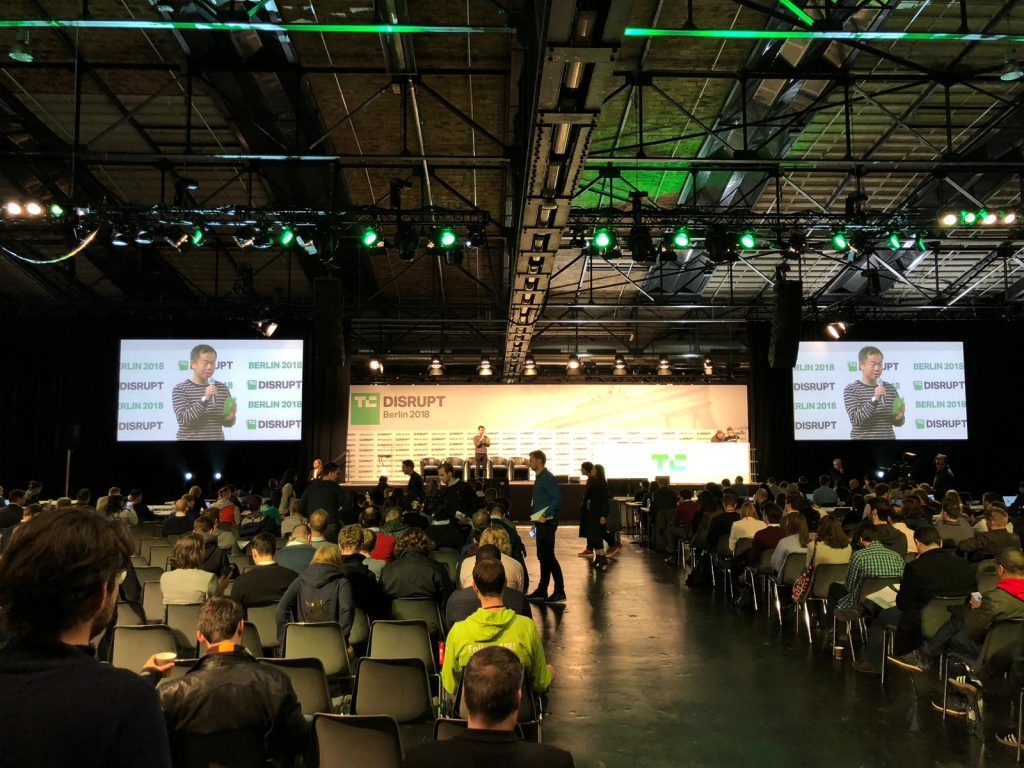
TC Disrupt Berlin 2018 Highlights
03.12.2018
Evgeny Zasorin
TechCrunch is the world’s leading source for technology and innovation related topics. TechCrunch regularly hosts tech conferences, called TC Disrupt, which bring together leading minds in the tech industry to discuss technology breakthroughs that change our lives, showcase revolutionary products and network with entrepreneurs, investors and tech fans.
This year TC Disrupt took place in Berlin and hosted industry experts from various fields to discuss technology-related subjects varying from the future of city planning to space exploration. Besides panel discussions, Disrupt Berlin brought together more than 400 early-stage startups to showcase their products, attract capital and source talent. From these startups, TechCrunch selected 13 contestants from different industries to compete in the Startup Battlefield for equity-free $50.000. The five finalists included technology companies in the fields of agriculture, health, data encryption and city planning.
Compared to the previous year, the most common topics discussed among entrepreneurs and investors were health & bio-tech, mobility and robotics. Blockchain also brought heated debates due it’s unclear commercial use cases and relatively low adoption rates. As a matter of fact, investors believe the real disruption comes from the business model more often than from the technology.
Below are highlights for some of the widely discussed topics at Disrupt Berlin.
Mobility (mostly 🛴)
The panel discussion with Caen Contee, VP of Marketing of Lime, brought a few important insights:
- It’s highly important to keep an efficient and environmentally friendly product life cycle to develop sustainable commuting (Lime’s e-scooters are carbon free and custom made for the shared economy)
- E-scooters is just a small part of a bigger ecosystem (while e-scooters are convenient for short distances, Lime also offers e-bikes for longer distances)
- Most of the companies in the space are still in the process of finding the right business model that is scalable (Bird announced to sell scooters directly to consumers and allow rental possibilities)
Blockchain
As many say, Blockchain is a 22nd century technology that fell by chance into the early 21st century. That is quite close to reality as we see a significant amount of barriers for mass adoption. Jamie Burke of Outlier Ventures and Vinay Gupta of Mattereum discussed what is the status quo of blockchain applications and where we are heading:
- We are currently going through a “crypto winter” with companies laying off staff as not able to raise additional funding due to not market-ready products.
- ICO has proven to be a successful medium for crowd-financing blockchain startups. However due to a lot of controversies, including scams and market manipulation, VC remains a preferable option of financing.
- However, Blockchain startups are still struggling to raise institutional money due to nuclear regulatory environment. We need a machine interface to legal reality —regulation is key.
- Regulated exchanges will come up and bring stability to the industry, although it will become looking more like regular finance.
- With all that, both Jamie and Vinay see equity-like tokens (security tokens or STOs) on the up and become big enough to challenge existing IPO industry.
- Although there is no established infrastructure for STOs, we expect to see the first digital security tokens to appear on exchanges by the end of 2018.
AI/Machine Learning
The topic remains “hot” due to a wide spectrum of possible applications and high adoptions rates. The vast majority of Fortune 500 companies are already undergoing / initiating digital transformations to leverage big data and machine learning. The use cases are massively broad ranging from supply chain management to healthcare.
Talking about healthcare, some people in the industry are of an opinion that medtech startups can face certain challenges of developing ML-based products due to limitations of access to training data. To ensure high-quality results, one need accurate, reliable and complete data. Hence, the regulatory framework needs further adjustments regarding the use of data and privacy.
Augmented | Virtual | Mixed Reality
The industry is still in the exploratory phase due to a lack of clear use cases aside from gaming and communications. Most of the applications of the technology remain consumer centric with content being the most challenging part.
In order to reach the “aha” moment, experts argued to have better hardware capabilities. Perhaps recent launch and future development of Magic Leap will create a new platform for deploying useful B2B applications for industries such as construction, health care, public safety, etc.
In the Startup Alley, Nucleus Technologies presented one of the areas how augmented reality (AR) can be used in the B2B sector. Their product, Clark Vision, offers a solution based on AR to improve workers’ efficiency and safety across industries.
Here are just some of the insights one could get at TC Disrupt Berlin. It was a unique opportunity to meet with leading tech minds across various industries and discover upcoming revolutionary products.